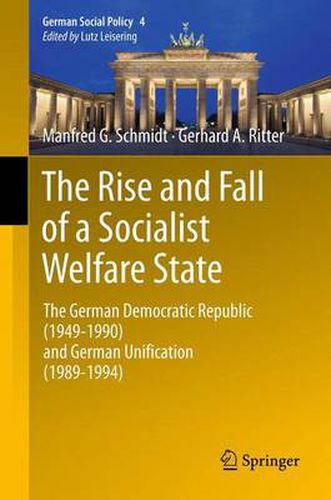Readings Newsletter
Become a Readings Member to make your shopping experience even easier.
Sign in or sign up for free!
You’re not far away from qualifying for FREE standard shipping within Australia
You’ve qualified for FREE standard shipping within Australia
The cart is loading…






This title is printed to order. This book may have been self-published. If so, we cannot guarantee the quality of the content. In the main most books will have gone through the editing process however some may not. We therefore suggest that you be aware of this before ordering this book. If in doubt check either the author or publisher’s details as we are unable to accept any returns unless they are faulty. Please contact us if you have any questions.
This book provides a comprehensive analysis of social policy in the German Democratic Republic (GDR, 1949-1990), followed by an analysis of the Social Union , the transformation of social policy in the process of German unification in 1990. Schmidt’s analysis of the GDR also depicts commonalities and differences between the welfare state in East and West Germany as well as in other East European and Western countries. He concludes that the GDR was unable to cope with the trade-off between ambitious social policy goals and a deteriorating economic performance. Ritter embeds his analysis of the Social Union in a general study of German unification, its international circumstances and its domestic repercussions (1989-1994). He argues that social policy played a pivotal role in German unification, and that there was no alternative to extending the West German welfare state to the East. Ritter, a distinguished historian, bases his contribution on an award-winning study for which he drew on archival sources and interviews with key actors. Schmidt is a distinguished political scientist.
$9.00 standard shipping within Australia
FREE standard shipping within Australia for orders over $100.00
Express & International shipping calculated at checkout
This title is printed to order. This book may have been self-published. If so, we cannot guarantee the quality of the content. In the main most books will have gone through the editing process however some may not. We therefore suggest that you be aware of this before ordering this book. If in doubt check either the author or publisher’s details as we are unable to accept any returns unless they are faulty. Please contact us if you have any questions.
This book provides a comprehensive analysis of social policy in the German Democratic Republic (GDR, 1949-1990), followed by an analysis of the Social Union , the transformation of social policy in the process of German unification in 1990. Schmidt’s analysis of the GDR also depicts commonalities and differences between the welfare state in East and West Germany as well as in other East European and Western countries. He concludes that the GDR was unable to cope with the trade-off between ambitious social policy goals and a deteriorating economic performance. Ritter embeds his analysis of the Social Union in a general study of German unification, its international circumstances and its domestic repercussions (1989-1994). He argues that social policy played a pivotal role in German unification, and that there was no alternative to extending the West German welfare state to the East. Ritter, a distinguished historian, bases his contribution on an award-winning study for which he drew on archival sources and interviews with key actors. Schmidt is a distinguished political scientist.